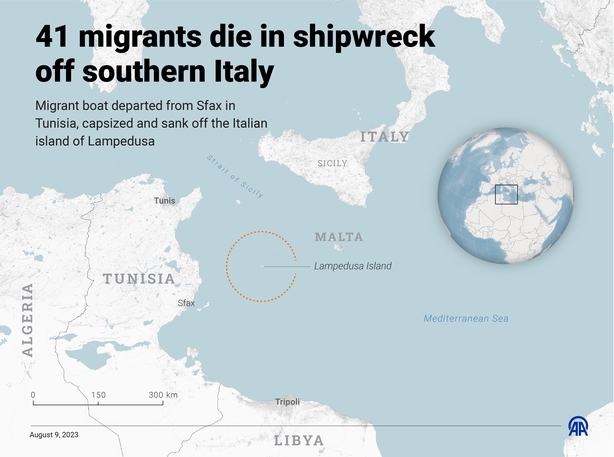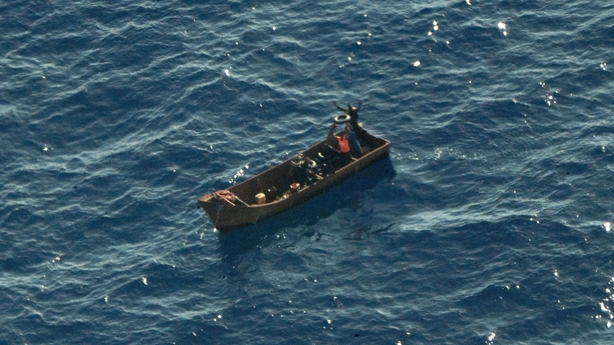At least 41 migrants have been killed in a shipwreck off Italy's Lampedusa island, the ANSA news agency has reported, citing accounts from survivors.
Ansa said four people who survived the shipwreck told rescuers that they were on a boat that had set off from Sfax in Tunisia and sank on its way to Italy's shores.
The survivors, three men and a woman from Ivory Coast and Guinea, said they were rescued by a cargo ship and then transferred onto an Italian coast guard vessel.

The coast guard did not immediately respond to a request for comment.
It was unclear if the news given by Ansa was linked to the two shipwrecks that the coast guard had reported on Sunday, saying around 30 people were missing from them.
The coast guard had also said they had recovered 57 survivors and two bodies, amid media reports that at least one of the sunken boats had set off from Sfax last Thursday.
Separately, Tunisian authorities said on Monday that they had recovered 11 bodies from a shipwreck near Sfax on Sunday, with 44 migrants still missing from that sinking.
Italy has seen around 93,700 migrant arrivals by sea so far this year, according to interior ministry data last updated on Monday, compared to 44,700 in the same period of 2022.
The four survivors were first seen yesterday by a civilian rescue organisation Sea-Watch, which monitors the situation in the central Mediterranean Sea using aeroplanes.

Speaking to RTÉ News, Paul Wagner from Sea-Watch said one of their aeroplanes spotted four people who were adrift without engines on an iron boat.
He said: "In the middle of the central Mediterranean Sea, which is very unusual because these boats are normally very packed with people. We alerted the ship in close vicinity to rescue the four people."
The survivors spent almost six days in the open sea. The initial boat they were on with 41 other migrants, sank just several hours after departure due to a storm.
Mr Wagner said: "Normally the iron boats which are used on the Tunisian roads are made from iron, so they sink within a minute or something.
"This boat just sank very quickly and that's why probably the majority of people died, while, for example, in a wooden boat you can hold on to it.
"These four [survivors] had floating devices with them, so they swam until they saw another empty iron boat and climbed into it," Paul Wagner describes. He says local authorities were aware of the storm but didn't attempt rescue operations.
"We’ve seen in the last days more than 100 people dying in shipwrecks just because of the storm. Some of the boats and their positions were known and they haven't been rescued before the storm. These four were the lucky ones. That's the sad and infuriating story of global inequality."
Rescuers from Medicines sans Frontiers have seen an increase in departures from Tunisia.
Advocacy Manager with MSF Margot Bernard said that two more shipwrecks were reported last week off the Italian coast.
While many people were rescued, two bodies were recovered and 30 people were reported missing.
She said: "We also know that there are many shipwrecks that go unreported because nobody is there to see them. There are definitely more people missing at sea than the officially reported numbers."
Ms Bernard was personally involved in several rescues where people spent several days in the water.
"The people that we have rescued in those situations arrived on board extremely exhausted, dehydrated, and shocked.
"These types of situations are, unfortunately, not uncommon in the central Mediterranean. We see people embarking unseaworthy boats where anything could happen - they could have a failure of their engine; they could get lost."
MSF offers medical and psychological support to survivors.
Ms Bernard added: "We have a doctor, a nurse, a psychologist and a midwife to look after the people after they come on board. We are seeing that people would have experienced violence, including sexual violence, on the migration path. Therefore they’re often in need of urgent help."
Paul Wagner said as a non-profit monitoring organisation Sea-Watch has experienced pushback from local governments.
"We witnessed Libyan Coast Guard shooting in the water, next to migrant boats. We saw how they beat migrants in the sea. That's why this is a human rights monitoring mission that's so crucial for us."
Mr Wagner said that state organisations should "rescue migrants like they would rescue white people, which is not the case at the moment".
He added: "A state-lead rescue operation in the central Mediterranean Sea, which is not at all that expensive, could be a very important and a very realistic step for governments in Europe. But which they are not willing to take."
Additional reporting: Tania Reut
